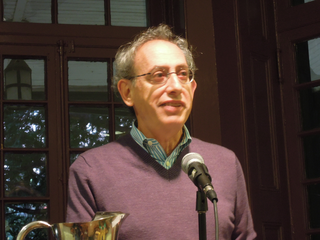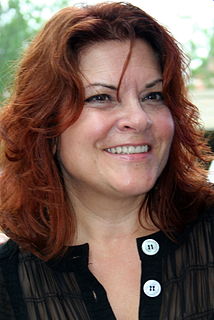A Quote by J. K. Rowling
With all of their benefits, and there are many, one of the things I regret about e-books is that they have taken away the necessity of trawling foreign bookshops or the shelves of holiday houses to find something to read. I've come across gems and stinkers that way, and both can be fun.
Related Quotes
Do you lend books and DVDs to people? If so, don't you always regret it? All my life I have forced books on to people who have subsequently forgotten all about it. Meanwhile, on my shelves sit many orphaned books loaned to me over the years by trusting, innocent souls - some as long ago as the Seventies.
The Librarian considered matters for a while. So…a dwarf and a troll. He preferred both species to humans. For one thing, neither of them were great readers. The Librarian was, of course, very much in favor of reading in general, but readers in particular got on his nerves. There was something, well, sacrilegious about the way they kept taking books off the shelves and wearing out the words by reading them. He liked people who loved and respected books, and the best way to do that, in the Librarian’s opinion, was to leave them on the shelves where Nature intended them to be.
It takes me about a week and a half to read the typical book. I don't know how many ten-day spans I have left. Eventually the unread books on my shelves will have to be abandoned, or they will join me on the pyre. The book I'm about to purchase may be among them. We all buy books we won't live to read.
In America there's a tendency to write the same book over and over because that's what sells. So in a way, my success in America has come at the expense of what I do. I haven't sold out, and I haven't taken the popular road to writing a best-selling book. I've really bucked the system. So it was necessary for me not to go and find the easy fans, the ones who want something digestible and fast with a happy ending that they can read over and over again no matter how many different books it is. I had to find fans who really wanted to think. Worldwide they all have that in common.
One day I would have all the books in the world, shelves and shelves of them. I would live my life in a tower of books. I would read all day long and eat peaches. And if any young knights in armor dared to come calling on their white chargers and plead with me to let down my hair, I would pelt them with peach pits until they went home.
It's actually as simple as this. New authors, building their customer base, need physical bookshops. Physical bookshops are lovely tactile, friendly, expert, welcoming places. Physical books, which can only be seen and handled in physical bookshops, are lovely, tactile things. Destroy those bookshops, and the very commercial and cultural base to the book industry is destroyed. Once and for all. Like Humpty Dumpty, it can never be put together again.
The coming of the printing press must have seemed as if it would turn the world upside down in the way it spread and, above all, democratized knowledge. Provide you could pay and read, what was on the shelves in the new bookshops was yours for the taking. The speed with which printing presses and their operators fanned out across Europe is extraordinary. From the single Mainz press of 1457, it took only twenty-three years to establish presses in 110 towns: 50 in Italy, 30 in Germany, 9 in France, 8 in Spain, 8 in Holland, 4 in England, and so on.
There is nothing for it but for all of us to invent our own ideal libraries of classics. I would say that such a library ought to be composed half of books we have read and that have really counted for us, and half of books we propose to read and presume will come to count—leaving a section of empty shelves for surprises and occasional discoveries


































